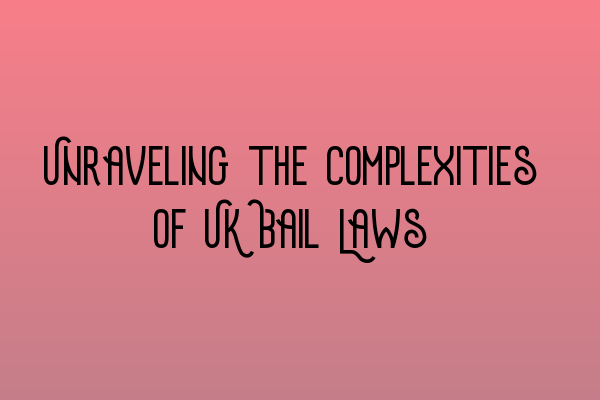Unraveling the Complexities of UK Bail Laws
In the UK, bail laws play a crucial role in the criminal justice system. They are designed to strike a delicate balance between the rights of the accused and the need to protect society. Understanding the complexities of UK bail laws is essential for both legal professionals and individuals involved in the criminal justice process. In this blog post, we will explore the intricacies of bail laws in the UK and shed light on important considerations that need to be made when dealing with bail applications.
The Basics of UK Bail Laws
Before delving into the complexities, let’s start with the basics. Bail, simply put, allows a person accused of a crime to be released from custody while awaiting trial. It is a fundamental principle that everyone is innocent until proven guilty, and bail laws embody this principle by providing individuals with the opportunity to maintain their freedom until they have their day in court.
In the UK, the Bail Act 1976 sets out the legal framework for granting or refusing bail. The Act applies to both criminal cases in the Magistrates’ Court and serious cases in the Crown Court. It outlines various factors that the court must consider when deciding whether to grant bail or remand the accused in custody, including:
- The nature and seriousness of the offense
- The strength of the evidence against the accused
- The accused’s previous convictions and record of failing to surrender to bail
- The accused’s character, community ties, and likelihood to abscond
- The protection of the public and any victims or witnesses
The court’s decision on bail is made on a case-by-case basis, taking into account the specific circumstances and risks involved.
The Complexities of UK Bail Laws
Despite the seemingly straightforward nature of the principles governing bail, there are numerous complexities that complicate the process. For instance, bail can be granted with or without conditions. Common conditions include reporting to a police station, surrendering travel documents, and observing a curfew. Failure to comply with these conditions may result in bail being revoked and the accused returning to custody.
Another complexity arises when considering the different types of bail available. The most common types of bail are police station bail, court bail, and conditional bail. Each type has its own particularities and requirements, and navigating these differences can be challenging for individuals and legal professionals alike.
Moreover, the bail laws in the UK are subject to continuous developments and amendments. It is crucial for legal professionals to stay abreast of these changes to ensure they are providing accurate and up-to-date advice to their clients. SQE Criminal Law & Practice Law UK offers comprehensive SQE workshops on criminal law, including bail laws, to help legal professionals enhance their knowledge and skills in this area.
Conclusion
Unraveling the complexities of UK bail laws is an ongoing endeavor. The delicate balance between individual rights and public safety requires careful consideration of various factors when deciding whether to grant or refuse bail. Legal professionals and individuals involved in the criminal justice process must stay informed about the evolving landscape of bail laws and the implications they have on the rights of the accused.
For more insights into the intricacies of UK law, be sure to check out our related articles:
- Essentials of Consideration: Understanding the Backbone of Contracts
- Mistake in Contract Law: Unraveling the Impact on Agreement Validity
- Counter-offers: The Art of Negotiating in Contract Law
- The Formation of a Contract: Understanding the Building Blocks of Agreement
- SQE Workshops on Contract Law: Strengthening Your Knowledge and Skills
At SQE Criminal Law & Practice Law UK, we are committed to providing comprehensive resources and support to legal professionals. Our SQE workshops are designed to strengthen your knowledge and skills in criminal law, ensuring you stay at the forefront of the legal profession.
